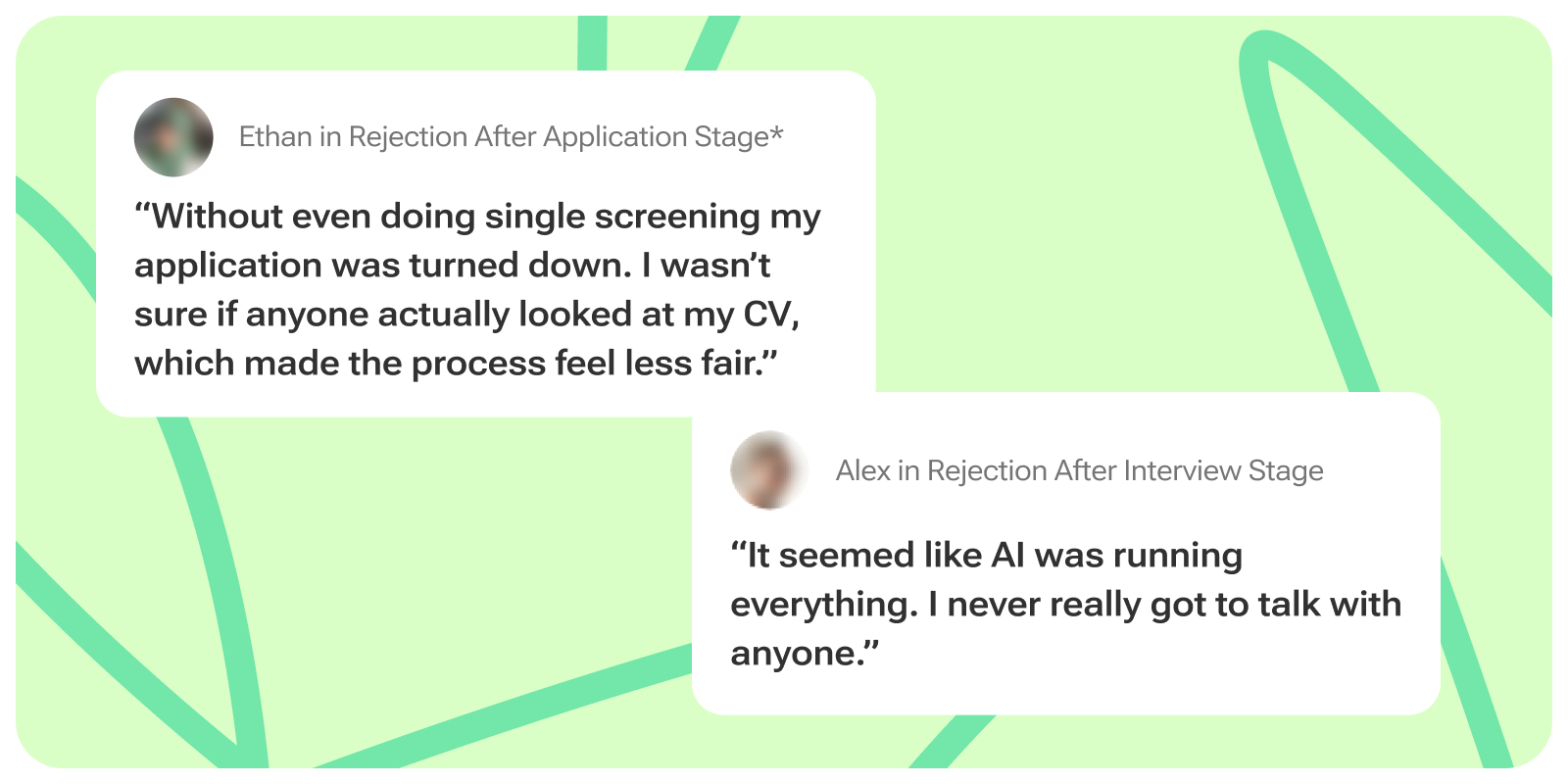Artificial Intelligence (AI) has become a talking point in nearly every part of recruitment. From resume screening and interview scheduling to personalized job recommendations, AI has made hiring faster and more efficient. For recruiters and Talent Acquisition (TA) teams, the appeal is clear: AI-powered tools can handle repetitive tasks, process vast amounts of data, and deliver real-time updates to job seekers.
But what about the candidates? Does AI actually improve Candidate Experience or does it risk making the process feel less human and personal?
Because Candidate Experience is more than just how quickly the hiring process moves. It’s about how respected, informed, and valued people feel when they apply for a role.
In this article, we talk about the opportunities, risks, and best practices for using AI in recruitment when trying to balance efficiency with empathy.
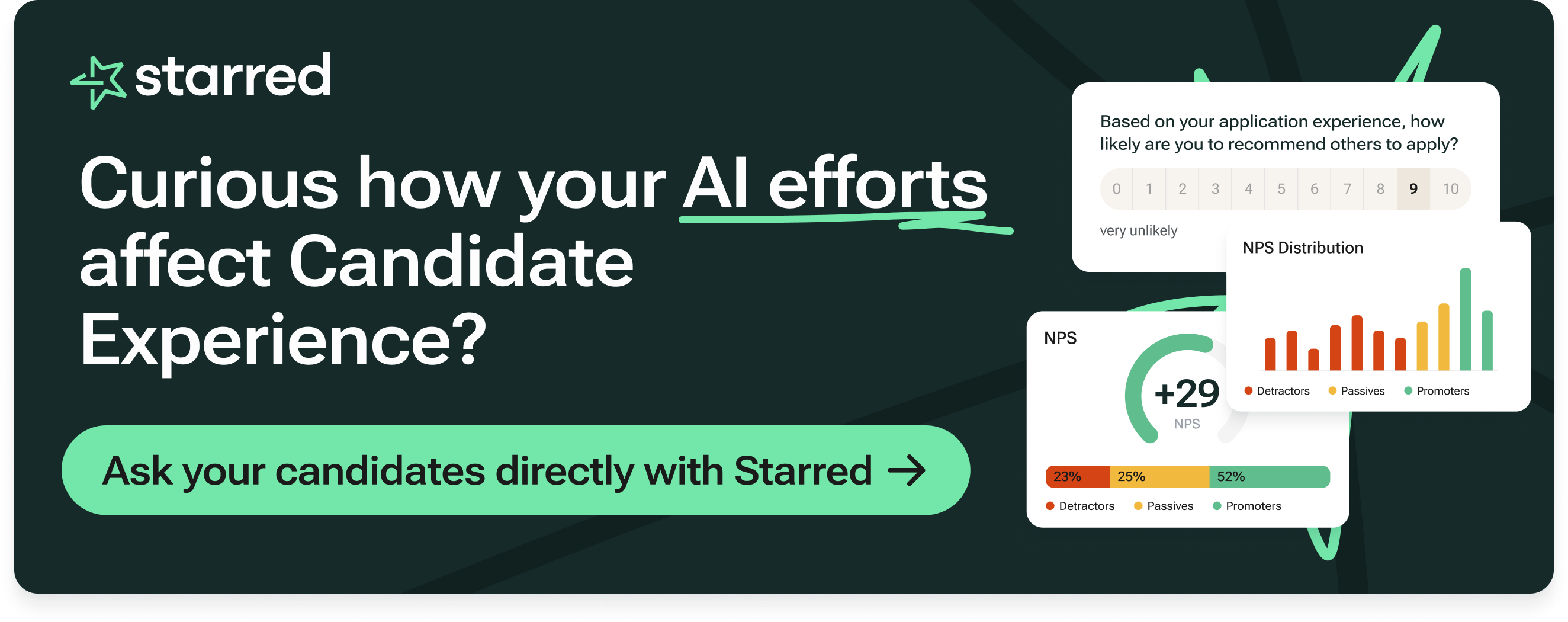
Benefits of Using AI to Improve Candidate Experience
Data shared in our recent panel from Cronofy shows that 74% of candidates say that human touch is still vitally important in hiring. Yet, with the rise of automation and the increasing demands on TA teams, there’s a paradox: candidates expect more personal interaction, but recruiters are under pressure to deliver faster results with fewer resources.
This is where Artificial Intelligence can step in, not as a replacement for people, but as a tool to help create better hiring journeys. When applied thoughtfully, AI can take care of the repetitive, behind-the-scenes tasks, freeing up recruiters to focus on building relationships, engaging with top talent, and creating the kind of positive Candidate Experience that sets an organisation apart.
Here are 5 benefits AI and automation can bring to recruitment teams, and how they translate into better Candidate Experience:
1. Remove Friction From The Hiring Process
AI systems can automate admin-heavy tasks like the resume screening process, scheduling, and initial communication, allowing recruiters to move candidates through the process faster without cutting corners. For TA teams under pressure to “do more with less,” this means being able to manage more roles and applicants at once and spend more time being present with candidates.
- Example: In our panel, Mark Harman from Wise shared how they automated interview scheduling. Instead of a recruiter manually arranging interviews, candidates automatically receive a link to pick a time from the recruiter’s calendar, cutting out back-and-forth emails and freeing hundreds of recruiter hours annually.
2. Improve Communication and Transparency
With 64% of withdrawn candidates citing poor communication as the main reason for leaving the recruitment process, implementing real-time automated updates on application status and scheduled follow-ups can make a big difference in keeping the best candidates engaged and reducing uncertainty around the hiring process.
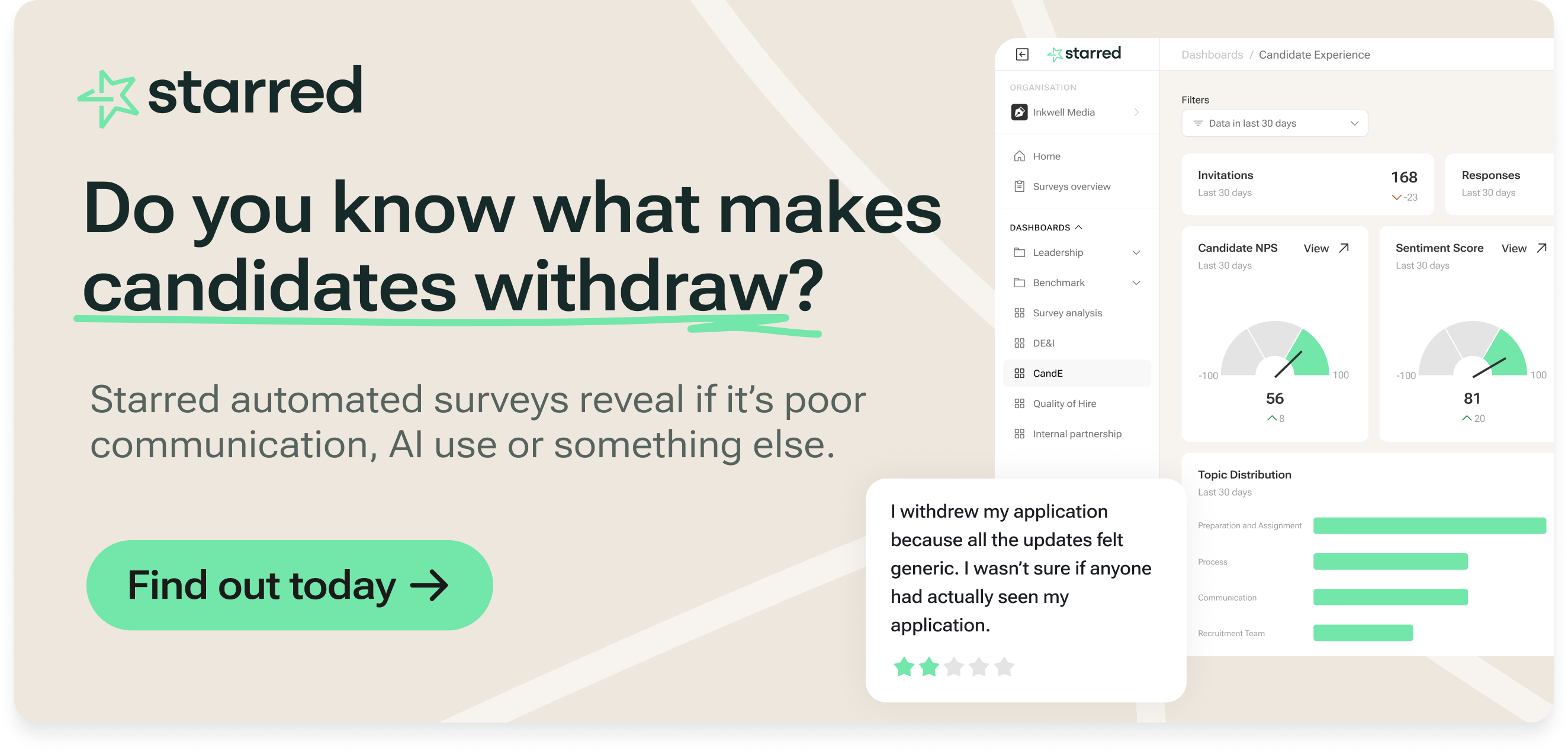
3. Enable Data-Driven Decision Making
AI-powered and automated candidate feedback collection gives recruitment teams the ability to analyze large volumes of data and spot patterns in real time. For example, it can reveal where candidates are most likely to drop out, which stages cause delays, or which roles consistently take the longest to fill. Over time, acting on these data-driven insights helps teams create smoother journeys for candidates, improve conversion rates, and demonstrate measurable ROI of Candidate Experience.
4. Scale Without Losing Quality
AI allows recruitment teams to handle a higher volume of qualified candidates without sacrificing the quality of interactions. Whether it’s a spike in applications for a specific role or ongoing high-volume hiring, teams can scale up confidently knowing candidates will still receive timely communication and fair consideration.
5. Create A Competitive Advantage
Ultimately, AI tools work best when they create space for recruiters to focus on what only humans can do: building trust, having real interactions and making personal connections. By removing admin tasks and ensuring consistent communication, AI gives recruiters more resources to focus on the moments that count, such as delivering detailed personalized feedback or helping candidates prepare for interviews. These human touches are what turn a smooth process into a competitive advantage in attracting, winning, and retaining the best talent.
Where Using AI In Recruitment Can Go Wrong
The potential benefits of AI-powered tools in recruitment are real, but so are the risks. With 67% of job seekers saying they’re “uncomfortable” with employers using AI to review resumes and make decisions, it’s a signal that many candidates are already skeptical, making it essential to understand these concerns and address them before they escalate.
Here are a few things to be aware of when implementing AI and automation:
1. Lack of empathy
Automation can speed things up, but it can also make the process feel impersonal if done wrong. In our recent panel, Starred's CEO, Daniel Birkholm, shared a great example of how that can happen: one of the few things worse than waiting a long time for a rejection is getting one instantly. Imagine spending hours tailoring your CV and reading up on a company, only to receive an automated “no” within seconds. For the candidates, this is a clear sign that no human has seen their application and a warning to steer clear of future job applications with the company.
2. Over-Prioritizing Efficiency
AI can move candidates through the application process quickly, but if that speed comes at the cost of personal connection, the experience and employer brand suffer. Upcoming research from Cronofy revealed that candidates expect to speak to a human at almost every stage of the recruitment process. Sending only generic, automated interview invites without a personal note can make even a well-qualified candidate feel like they’re just another number in the system.
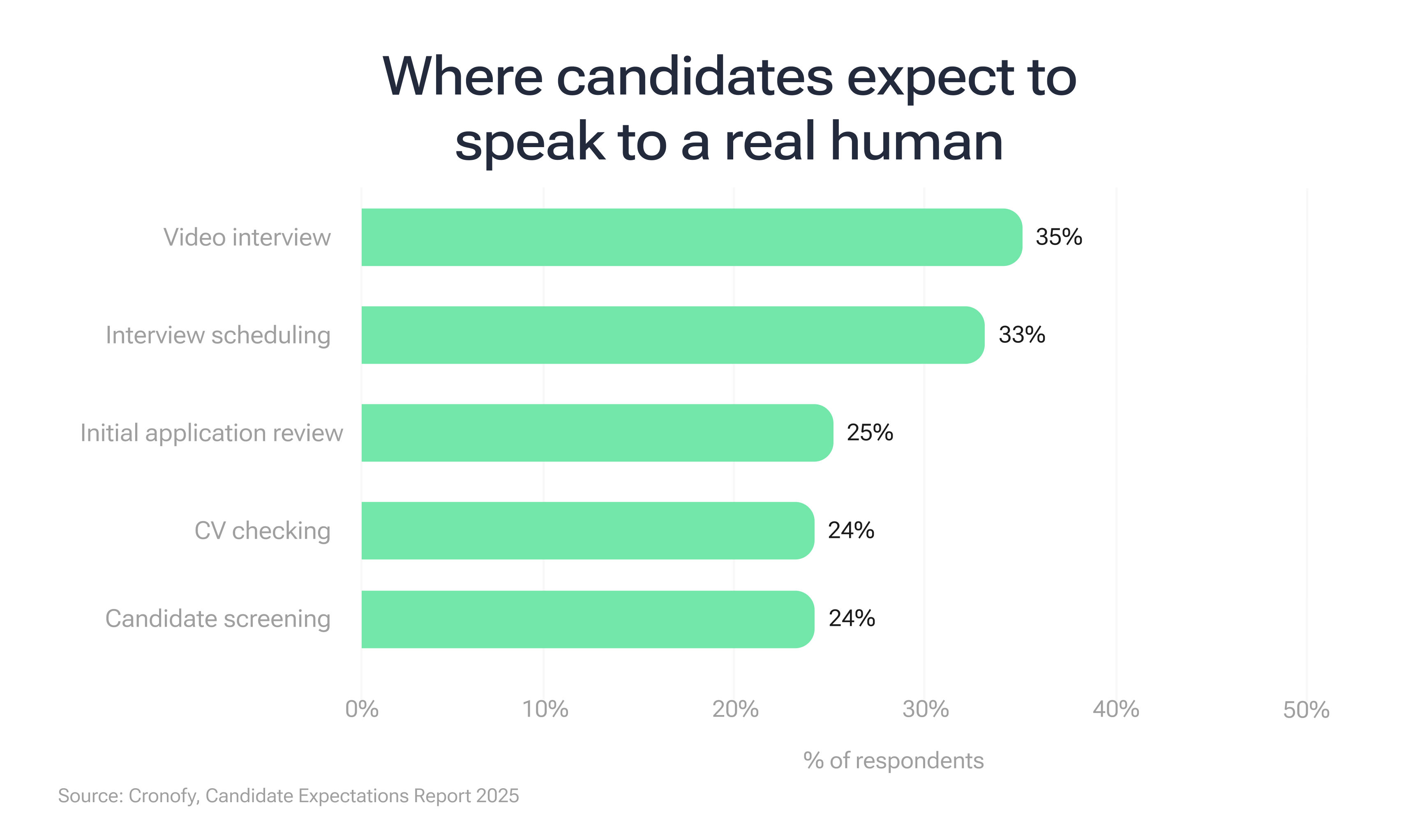
3. Bias and Ethical Concerns
Because AI systems learn from historical hiring data, they can unintentionally replicate unconscious bias and filter out candidates based on patterns that don’t reflect current diversity and inclusion goals. If left unsupervised and unmonitored, this can harm candidate satisfaction and create serious ethical considerations and reputational risks for the organization.
4. Lack of Transparency Damages Trust
Candidates want to understand how hiring decisions are made. With 90% job seekers saying that they want companies to be upfront about using AI in recruiting and hiring, being transparent is more important than ever. If they feel that AI is used without human oversight or if the company is not transparent about the use of smart tools, candidates feel that the recruitment process is dishonest. For example, an applicant who learns after the fact that their resume was screened entirely by an algorithm may question whether the process was fair or whether relevant skills were overlooked.
5. Generational Differences in AI Acceptance
Not all candidates view AI in the recruitment journey the same way. Younger candidates, especially Gen Z, tend to be more used to technology being involved, while older generations remain more skeptical. If recruitment teams are not clear about how AI is used, this difference in perception can lead to confusion or discrimination against certain candidate groups.
These risks aren’t a reason to avoid AI, but a reminder that technology should be adopted with purpose and care, driven by clear goals, not simply because it’s the latest trend. The key is finding the right balance, adapting to new tools without sacrificing the human connection that candidates value most.
Finding the Right Balance: AI + Human Touch
Looking at both the benefits and risks, one thing becomes clear: the true challenge of using AI in recruitment is how to use it so it benefits both the TA teams and candidates. Striking that balance can be tricky: lean too heavily on AI, and the human connection may disappear. Rely too much on manual processes, and the hiring process can slow down, risking the loss of top talent to faster-moving competitors.
Our advice is simple: design the hiring process with empathy first, then use AI and automation to support that design and make it more efficient.
"Design the hiring process with empathy rather than efficiency. You automate for efficiency and that is most likely something that the candidates actually would like if they get something faster and better, but the process itself, the experience itself, has to be with empathy." – Daniel Birkholm, Starred CEO
That means thinking about what the ideal candidate journey should feel like before deciding which parts to automate. The goal should be to create a process where AI does the heavy lifting in the background, freeing recruiters to focus on empathy, communication, and building relationships.
- Tip: Think about how to create “moments that count" – small touches that make candidates feel valued during the recruitment process. In our panel, Mark Harman from Wise revealed how they create the touchpoints that matter, ranging from sending “good luck” texts before interviews to adding lighthearted messages in Zoom waiting rooms to help candidates relax. Watch the full conversation to hear more examples!
How To Measure the Success of AI Initiatives?
By asking the people who matter most: your candidates. Their feedback is the most direct measure of whether your recruitment process feels both efficient and personal. It can reveal if your use of AI-powered tools is speeding things up without making candidates feel like they’ve lost the human touch, or if certain steps feel too automated and transactional.
The key is to gather candidate feedback consistently and at different moments, for example, after multiple rejection touchpoints: after application, interviews and assessments. Doing so gives you a clear picture of the experience from multiple points in the recruitment journey.
And this is another example of where automating this process, with a platform like Starred, will allow you to capture insights at scale without adding extra admin for recruiting teams. Over time, candidate data will highlight patterns, pinpoint stages that need improvement, and confirm whether your balance between AI and human connection is working well.
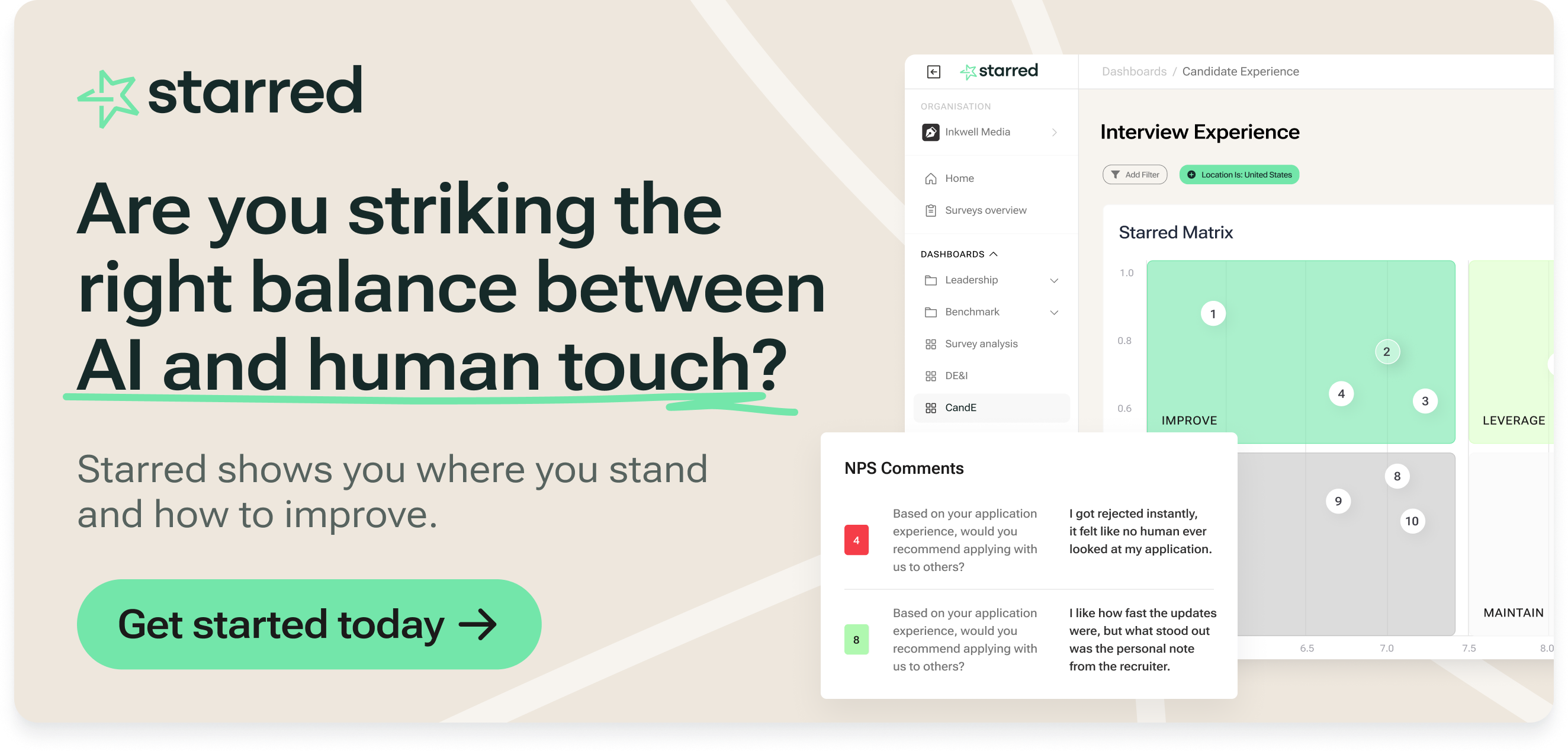
Conclusion: Does AI Help Improve Candidate Experience?
The honest answer is: it can IF you put people first.
AI creates opportunities to speed things up, make communication more consistent, and free recruiters from repetitive tasks. But it’s not a magic fix, and implementing AI without empathy can harm the very experience it’s meant to improve. The hiring teams that get it right are intentional. That means knowing which parts of the recruitment journey to automate, which to keep human-led, and continuously check that balance through consistent candidate feedback.
FAQ: Candidate Experience & AI
- How can AI improve Candidate Experience?
AI can improve Candidate Experience by streamlining the hiring process, automating repetitive tasks such as resume screening, interview scheduling, and application status updates. This can free up recruiters' time to focus on interacting with candidates and improving recruitment strategies. At the same time, if AI is overused or poorly implemented, it can create the opposite effect: making the process feel cold, impersonal, or unfair. The real benefit comes when AI is used thoughtfully to support, rather than replace, the human connection. - What are the risks of AI in hiring?
If automation and AI are implemented without having a clear plan in place, the risks include making the recruitment process feel impersonal, introducing bias if AI systems are trained on skewed data, damaging trust through a lack of transparency, and potentially deterring candidates who are uncomfortable with technology-led hiring. - Does AI help attract top talent?
Yes, if used with empathy and intention, leveraging AI can give companies a competitive advantage. Faster communication, transparent processes, and consistent candidate care can reduce drop-off rates and help secure top talent before competitors. - How to measure AI success in recruitment?
One of the best ways to measure success is by collecting and analyzing candidate feedback at multiple points in the recruitment journey. Automated Candidate Experience surveys can reveal whether AI is improving speed and efficiency without sacrificing the personal connection candidates value. - What’s the right balance between AI and human touch?
Design the process with empathy first, then use AI to support (not replace) personal moments. The goal should be to create a process where AI does the heavy lifting in the background, freeing recruiters to focus on empathy, communication, and building a positive Candidate Experience.

